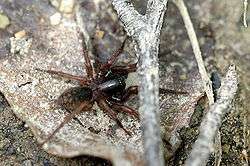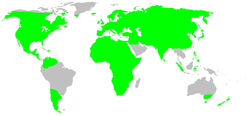Dwarf sheet spider
| Dwarf sheet spider | |
|---|---|
 | |
| Cryphoeca silvicola | |
| Scientific classification | |
| Kingdom: | Animalia |
| Phylum: | Arthropoda |
| Class: | Arachnida |
| Order: | Araneae |
| Suborder: | Opisthothelae |
| Infraorder: | Araneomorphae |
| Family: | Hahniidae Bertkau, 1878 |
| Genera | |
|
See text. | |
| Diversity | |
| 26 genera, 235 species | |
 | |
The dwarf sheet spiders (family Hahniidae) are small spiders, their bodies are about 2 mm in length. They build extremely delicate webs in the form of a sheet, and unlike many spiders the web does not lead to a retreat. The silk used in these webs is so fine that they are difficult to spot unless they are coated with dew. They greatly favor locations near water or near moss, and are often found in leaf litter and detritus or on the leaves of shrubs and trees.[1]
Description
They are characterized by the arrangement of their six spinnerets in a transverse row. The last segment of the outer spinnerets is quite long and stands out above all the others.[1]
Distribution
Hahniidae are a worldwide family. The genera of the Northern Hemisphere and Africa tend to differ in their genital structures from those of the Southern Hemisphere. Very few species have been described from south east Asia, although quite a number seems to be yet undescribed.[1]
Name
The family is named after the type genus Hahnia, which is dedicated to German zoologist Carl Wilhelm Hahn.
Genera
- Alistra Thorell, 1894 — Oceania, Philippines, Sumatra, Sri Lanka
- Amaloxenops Schiapelli & Gerschman, 1958 — Argentina
- Antistea Simon, 1898 — North America, Europe, Russia
- Asiohahnia Ovtchinnikov, 1992 — Kazakhstan, Kirgizistan
- Austrohahnia Mello-Leitão, 1942 — Argentina
- Calymmaria Chamberlin & Ivie, 1937 — Mexico to Canada
- Cryphoeca Thorell, 1870 — Palearctic
- Cryphoecina Deltshev, 1997 — Montenegro
- Cybaeolus Simon, 1884 — Chile, Argentina
- Dirksia Chamberlin & Ivie, 1942 — USA, Alaska, France
- Ethobuella Chamberlin & Ivie, 1937 — North America
- Hahnia C. L. Koch, 1841 — America, Africa, Europe, Asia
- Harmiella Brignoli, 1979 — Brazil
- Iberina Simon, 1881 — Russia, France
- Intihuatana Lehtinen, 1967 — Argentina
- Kapanga Forster, 1970 — New Zealand
- Lizarba Roth, 1967 — Brazil
- Neoantistea Gertsch, 1934 — Canada to Costa Rica, Russia, Asia
- Neoaviola Butler, 1929 — Australia
- Neocryphoeca Roth, 1970 — USA
- Neohahnia Mello-Leitão, 1917 — South America
- Pacifantistea Marusik, 2011 — Kuril Islands[2]
- Porioides Forster, 1989 — New Zealand
- Rinawa Forster, 1970 — New Zealand
- Scotospilus Simon, 1886 — Tasmania, New Zealand, India
- Tuberta Simon, 1884 — Europe to Azerbaijan
- Willisus Roth, 1981 — USA
See also
Footnotes
References
- Marusik, Yuri M. (2011). "A new genus of hahniid spiders from Far East Asia (Araneae: Hahniidae)." Zootaxa 2788: 57-66.
- Murphy, Frances & Murphy, John (2000): An Introduction to the Spiders of South East Asia. Malaysian Nature Society, Kuala Lumpur.
- Platnick, Norman I. (2007): The world spider catalog, version 8.0. American Museum of Natural History.
External links
| Wikispecies has information related to: Hahniidae |
| Wikimedia Commons has media related to Hahniidae. |